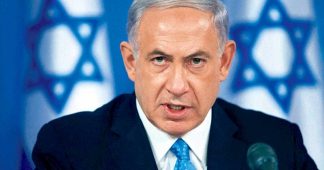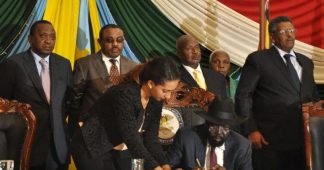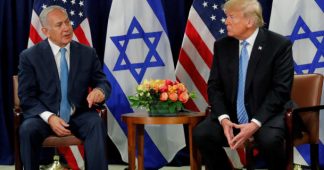02/12/2020
On February 3, 2010 a truly landmark event took place– Israeli Prime Minister Benjamin Netanyahu met with the head of the Sudan’s Transitional Sovereign Council, Abdel Fattah al-Burhan, in Uganda, and agreed to start cooperation to normalize relations between the countries.
Israel and Sudan have no diplomatic relations. The former leader of the country, Omar Bashir, was an outspoken opponent of Zionism. Sudan, as an Arab country, condemned Zionism and always supported Palestine.
Israeli-Sudanese rapprochement
In Sudan itself, a message about a meeting between the head of the country and Netanyahu caused a stir, especially since it took place just a few days after US President Donald Trump presented the pro-Israel “Deal of the Century.”
Israeli Prime Minister Benjamin Netanyahu announced the meeting in Kampala with al-Burhan on Monday on his Twitter page, indicating that he had agreed with the head of Sudan to begin cooperation to establish relations between the countries.
נפגשתי באנטבה עם יו"ר מועצת הריבונות של סודן, עבד אלפתח אלברהאן, והסכמנו להתחיל שיתוף פעולה שיוביל לנורמליזציה של היחסים בין שתי המדינות. היסטוריה!
— Benjamin Netanyahu (@netanyahu) February 3, 2020
Meanwhile, the Sudanese Foreign Ministry declared that they did not know anything about this meeting. On Tuesday, the government had an emergency meeting to clarify the circumstances of the unplanned negotiations.
Explaining the meeting with Netanyahu, al-Burhan emphasized that, despite the meeting with the Israeli prime minister, Khartoum’s position on the Palestinian issue remains unchanged. Sudan continues to advocate the creation of an independent Palestinian state. At the same time, the head of Sudan stated that he had taken this step with the aim of preserving and maintaining the national security of Sudan.
In a sign of protest against the negotiations, the Director of the Foreign Policy Department of the Sovereign Council, Ambassador Rashad Faraj Al-Tayyib, presented his resignation to the President of the Council (https://alintibaha.net/online/21809/) At the same time, the Umma Party, led by Mubarak al-Fadil al-Mahdi, welcomed the meeting .(https://alintibaha.net/online/21680/
Israeli political expert Barak Rawid told Israeli Channel 13 that one of Sudan’s demands for Israel is there assistance in opening doors to relations with Washington. Sudan wants the United States to remove them from the list of sponsors of terrorism. Netanyahu raised the issue in a recent meeting with Secretary of State of the USA Mike Pompeo.
As previously noted by the Israeli media, Sudan was considering the possibility of normalizing relations with Israel in order to lift US sanctions back in 2016.
Restoring relationships
Israel, according to the Israeli media, is primarily interested in providing Sudan airspace for its civilian airliners. However, as the Jerusalem Post noted that Sudan ”is an important country because it is part of the Arab League and has been at the center of Riyadh-Ankara rivalry.”
Israel’s attempt to build relations with Sudan should be seen in the context of Trump’s Deal of the Century. It is significant that the deal was initially supported by Saudi Arabia and the UAE, which, since the overthrow of Omar Bashir, has attempted to strengthen their influence in Sudan. American media reported that the United Arab Emirates, the United States and Israel held a meeting in Washington late last year to develop a common strategy to counter Iran. ( https://www.axios.com/israel-uae-white-house-meeting-iran-trump-kushner-ec81aa24-02db-4920-b4f2-88eec301222c.html )
The meeting between Netanyahu and al-Burhan was purportedly orchestrated by the United Arab Emirates, reports the Associated Press .
Thus, Israel, by taking advantage of the Gulf powers (with the exception of Qatar), is trying to expand its support base among Arab countries. Tel Aviv’s main goal is to blur the unity of the Arab and wider Muslim world and reduce the influence of its rivals Iran and Turkey. Given the sharply worsened relations between Ankara and Tel Aviv, it is expected that Israel, together with the UAE and Saudi Arabia, will try to squeeze Turkey out of Sudan.
el Aviv’s main weapon is the diplomatic support in the United States, promises of economic support, security cooperation and arms supplies.
Last year, during Netanyahu’s visit to Chad, the Israeli Prime Minister announced the restoration of diplomatic relations with this country. This mostly Muslim country located in the center of the Sahel is of great strategic importance, as it borders Sudan, Libya, the Central African Republic, Niger, Nigeria and Cameroon. Chad, in restoring relations with Israel, is showing interest in cooperation in the field of security and the acquisition of Israeli weapons. https://www.timesofisrael.com/chad-said-to-condition-resumed-ties-with-israel-on-extensive-weapons-sales/
As the Israeli media noted, restoring diplomatic relations with Chad will help Israel in “laying the groundwork for normalizing ties with Muslim-majority countries Sudan, Mali and Niger.”
In February 2019, Benjamin Netanyahu, while addressing the Conference of Presidents of Major American Jewish Organizations, spoke about Israel’s return to Africa. The Prime Minister identified Mali and Niger as countries with which Israel might establish diplomatic relations.
The media has also reported that Israel is trying to establish formal diplomatic ties with Morocco. To accomplish this, Tel Aviv is ready to recognize the sovereignty of Morocco over the Western Sahara. Moreover, the American web-site Axios writes that “Israel and the US have been discussing a deal that would see the US recognize Moroccan sovereignty in the occupied Western Sahara and Morocco take steps to normalize relations with Israel.”
It is known that since the 1960s, Israel and Morocco have been secretly cooperating as a result of negative relations between the two countries and the pan-Arab socialist regimes of North Africa.
Instruments of influence
The meeting between Benjamin Netanyahu and Abdel Fattah al-Burhan occurred during the Israeli Prime Minister’s visit to Uganda. He gave a speech alongside the president of the country Yoweri Museveni, and declared that “Israel is coming back to Africa and Africa is coming back to Israel in a big way.”
Indeed, in the 1950s and 60s, Israel began to actively develop ties with sub-Saharan Africa. However, then the Cold War and the pressure of Muslim countries led to a significant part of African countries brеаking off diplomatic relations with Tel Aviv.
At the same time, Israel actively developed relations with the apartheid regime in South Africa. Both countries cooperated in the field of nuclear technology, Israel also supplied the racist regime with weapons, bypassing the international embargo.
In 2016, Israel restored diplomatic relations with Guinea. Тhe same year, Netanyahu became the first Israeli prime minister to visit Africa for the first time in three decades. Israel has applied for observer status in the African Union (а status that Palestine already has).
In March 2019 at а meeting with the President of Liberia George Weah, Netanyahu said that “Africa is coming to Israel and so is the Entire world. We are turning Israel into a rising global power.” In the past year, Israel has also opened an embassy in Rwanda.
Israel, in its relations with African countries, is trying to present itself as the continent’s “savior.” Tel Aviv emphasizes how its technological capacity could increase agricultural productivity and expand people’s access to drinking water for African countries. Considering that many agricultural areas of the countries with which Israel cooperates in this direction are populated by Muslims, this is part of Israel’s strategy to improve its image in the eyes of African Muslims.
MASHAV, Israel’s Agency for International Development Cooperation, is currently implementing relevant projects in several African countries: Burkina Faso, Senegal, Cameroon, Ethiopia, Ghana, Kenya, Liberia, Madagascar, Malawi, Nigeria, Rwanda, Sierra Leone, Tanzania , Togo, Uganda and Zambia
Congratulations to all graduates of the capacity building program on ‘Applied Agricultural Extension Methods’ conducted by MASHAV experts in #Rwanda in cooperation with @RwandaAgri and @RwandaAgriBoard and the Embassy of @IsraelinRwanda pic.twitter.com/N58mjjECka
— MASHAV Israel (@MASHAVisrael) February 9, 2020
Arms supplies, security technologies and cybersecurity are also areas where the Israeli state and Israeli businesses are actively involved in Africa. Africareport reported that:
“Herzliya, a coastal neighborhood in northern Tel Aviv known as Israel’s ‘Silicon Valley of espionage,’ is home to a dense collection of intertwined companies including the Mer Group (Congo, Guinea, Nigeria and DRC, where it outfits the Agence nationale de renseignement), Verint Systems and Elbit Systems (South Africa, Angola, Ethiopia, Nigeria, etc.).”
Amnesty International accused Israeli company NSO Group of spying on opposition leaders in Rwanda, Morocco and Uganda (using their infamous Pegasus Software).
The Israelis are using all of these methods to expand their spy network in African countries.
Real goals
Israel’s interest in Trans-Saharan Africa is primarily due to it being a neighboring continent and “the geographic sphere lying immediately beyond its encircling enemies,” as the American Jewish Committee wrote. The 54 countries of Africa form a major voting bloc in the UN. These countries also make up nearly half of the members of both the Arab League and the Organization of Islamic Cooperation.
oram Elron, the deputy director general of the Africa division at the ministry of Foreign Affairs of Israel, does not hide the fact that rapprochement with Africa is part of a broader effort “to see more countries disengage from the positions of the African Union and vote against anti-Israeli Resolutions in international forums.”
Experts note that Israel is also paying attention to the countries of the Horn of Africa, primarily Somalia, bearing in mind the importance of this region for energy supplies to the Mediterranean. Tel Aviv also considers African countries an important market for arms exports.
Another reason is the growing importance of the continent in world geopolitics and the increased presence of other countries there. By expanding its presence in Africa, Tel Aviv hopes to contain its opponents who are also showing interest in the region, primarily Iran and Turkey.
Israel’s influence mainly overlaps with that of other Western countries. Moreover, many African governments embrace Israel because they want closer relationships with Washington. Israel is not an alternative to the Western neocolonialism, in fact, it is a new colonial country, that already applies apartheid practices on its territory, and where even Ethiopian Jews are treated as second class citizens. https://uwidata.com/7490-trumps-deal-of-the-century-a-stillborn-plan-for-legalized-apartheid/
However, there are serious challenges to strengthening Israeli presence in Africa. Israel has historically been an ally of the apartheid regime in South Africa, and Benjamin Netanyahu has advocated for the expulsion of African migrants from the country. The expansion of cooperation with Israel will necessarily lead to increased activity of Islamists, who will use it to legitimize their attacks against African governments.
Published at https://uwidata.com/7806-sudan-and-beyond-what-is-behind-growing-israeli-interest-in-africa/











